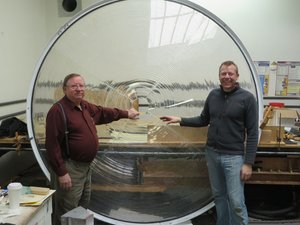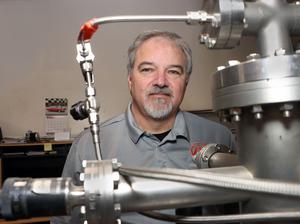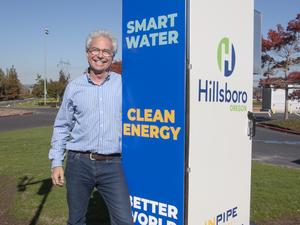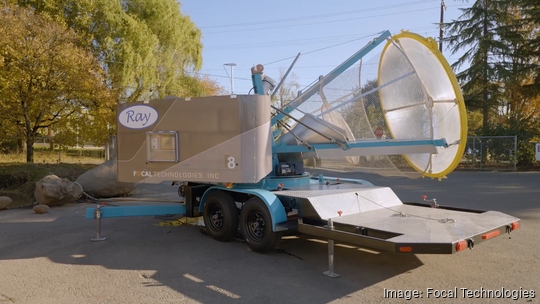
What is it? What does it do?
These are the questions Eric Steinmeyer fielded recently when he showed off the machine that he’s spent more than a decade working on to people he hopes might pay to use it.
“Ninety percent of them thought it was a light,” the founder and CEO of Focal Technologies said.
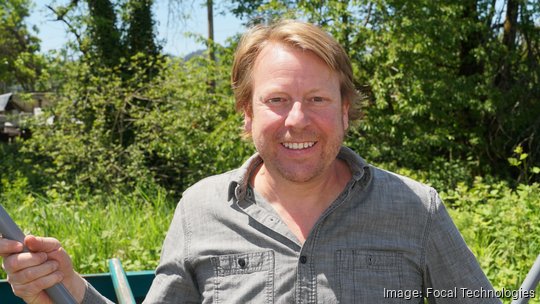
A curved translucent plate — 8 feet in diameter — attached to a base by angled steel brackets and pointed above the horizon does give the vague impression of a searchlight. But the plate works in the other direction. It’s a concentrating lens. By tracking the sun, it gathers heat and ultraviolet energy that is used to decontaminate wastewater pumped through the base system.
And it’s all on wheels, ready to be quickly set up where needed.
That’s an intriguing possibility to businesses whose processes leave them with water that doesn’t meet permitting requirements for disposal.
Want more Portland business news? Sign up for our daily email newsletters.
These businesses were always Focal Technologies’ target market with the device it calls Ray. Now, after struggling through years of scant funding, the Portland-based company has a refined model of Ray that it is trialing with potential customers. It has some fresh capital. Hope shines bright.
Getting market traction
Focal is working with a distributor to market the device. After a showing at the World Ag Expo in Tulare, California, in February — that’s where some initial reactions were quizzical — it went to a dairy, with a brewery lined up next.
“The folks that were potential customers, when they understood it, they seemed to be very excited about what it could do for them,” Steinmeyer said. “We got good traction from creamery operations and also packing and vegetable washing operations.”
Meanwhile, Focal Technologies is building two more units that it hopes to have out this summer.
The company is working off a recent $2.2 million Series A that pushed its total funding to $3.5 million through the end of 2022, with a post-money valuation around $9 million.
The cleantech nonprofit VertueLab aided Focal in its early going and remains its sole institutional investor. Otherwise, the company has scratched out funding from a wide scattering of small angel investors, now up to three dozen, many connected to cleantech investment groups.
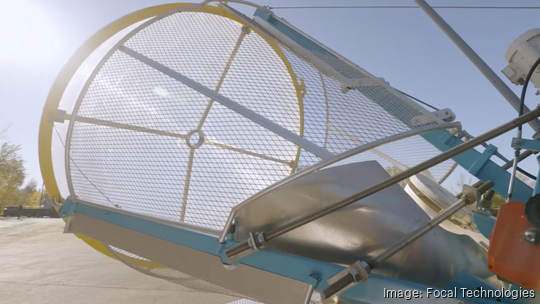
Steinmeyer calls Ray a disruptive technology, and those can be appealing to investors, but typically for software solutions (think Uber in the last decade, or now generative AI). Hardware is a different story.
“The venture capital system is not set up around a product that takes years and years to develop,” he said. “You’re operating in a funding ecosystem that was really designed for software, where you can rapidly scale and rapidly market because eventually somebody is going to catch up with you. And this is always going to be the challenge of trying to do cleantech development inside of the high-tech funding model.”
Focal Technologies thus aims to keep its operation lean, with a four-person staff that includes Steinmeyer, a marketing coordinator, a senior engineer and a CFO. It works with two main contractors — Galaxy Plastic Industries in Virginia for the lens and fabricator Tri-Lett Industries in Oregon City — for much of the rest of Ray’s hardware, among around 20 in total.
“We don’t want to be a direct fabricator, we want to be a contract manufacturer,” Steinmeyer said.
To allow for that, Focal had to map out its manufacturing specs in computer-assisted-design drawings. It took more than 2,000 of those for the current version.
Easier, cheaper manufacturing
“Now what we’re doing with the second and third units being manufactured is a series of minor alterations that are around making it quicker and easier and cheaper to manufacture,” Steinmeyer said. “We’re also optimizing a little of the technology, but it’s a much easier step.”
Models with bigger lenses, 16 and 40 feet in diameter, are planned.
Focal is monetizing Ray with a sale-plus-licensing model.
“Right now the sticker on it is $250,000,” Steinmeyer said. “And then there’s a licensing fee that the customer will pay that will allow us to meter the system on a cost-per-gallon basis.”
As a mobile device that can be rolled in and attached to existing systems, Ray gives Focal Technologies the opportunity to dial in charges that deliver value to its customers, Steinmeyer said.
“The cost of discharging a gallon or a ton of brewing waste in Bend is different than the cost for discharging a ton of brewing waste in New Orleans,” he said. “One of the things we’re most excited about is our ability to collect data on what the market is and what the charges can be in various jurisdictions and pull that all together into the into a single set of analytics.”
CLOSER LOOK
FOCAL TECHNOLOGIES
WHAT IT DOES: Focal invented the Ray, a mobile apparatus that uses a concentrating lens to gather heat and ultraviolet energy from the sun to decontaminate wastewater. The lean company uses contractors to build the units.
HEADQUARTERS: Portland
TOP EXEC: Founder and CEO Eric Steinmeyer
EMPLOYEES: Four
VENTURE FUNDING: $2.2 million in a recently closed Series A and $3.5 million total
TARGET MARKETS: Breweries, food processors and agricultural operations
